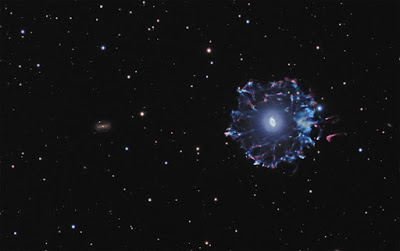"This Is What You Belong To"
By Ryann Holiday
"In 1950, a man grieving his young son who had just died of polio got a letter from Albert Einstein. Now, one might think that as a man of science, Einstein would have had a rather resigned view of the tragic nature of the human condition. We’re born. We’re buffeted by forces beyond our control, beyond our comprehension, and then we die. Often for no reason, leaving profound suffering in its wake.
Given the immensity of the events of the middle of the twentieth century - the Holocaust and the violence of the atomic age - it was quite reasonable that Einstein might be inured to the loss of a single child to whom he had no relation.
Instead, Einstein’s letter was one of profound and philosophic condolence. “A human being,” he wrote, “is a part of the whole, called by us ‘Universe,’ a part limited in time and space. He experiences himself, his thoughts and feelings as something separated from the rest - a kind of optical delusion of his consciousness. The striving to free oneself from this delusion is the one issue of true religion. Not to nourish the delusion but to try to overcome it is the way to reach the attainable measure of peace of mind.”
Einstein was expressing one of the few things that physics and philosophers and priests seem to agree on: That everything and everyone is far more connected than we are prone to think. We share an animating force, an energy, a unity that no matter what happens or how different things seem is always there. Even in our suffering, in our grief, we are tapping into something eternal and vast, something that makes us realize we are very much not alone.
“You think your pain and your heartbreak are unprecedented in the history of the world,” James Baldwin wrote, “and then you read.” It was books, history, philosophy, Baldwin said, that taught him that “the things that tormented me were the very things that connected me with all the people who were alive, or who had ever been alive.”
We are all one. It’s so easy to forget it, but it’s true.
The virtue of justice - what my new book "Right Thing, Right Now" is all about - is this idea that because of interconnectedness and interrelatedness, we have an obligation. Stoicism is not lone-wolfness. It’s the understanding that we are one single organism and that the fate of one is the fate of all.
As I wrote in "Stillness is the Key," no one has felt this more profoundly than the astronauts who had the unique experience of seeing the Earth from space. Whether they were American or Russian or Chinese, they were all overwhelmed by what has been called the “overview effect,” an instantaneous global consciousness, an inescapable sense that everyone is in the same boat, no matter where they live or what they believe.
What they experienced looking at the “Blue Marble” that is our planet was the exact thing that Hierocles, the 2nd century Stoic, was trying to teach people about two thousand years ago. Yes, we naturally think of ourselves and the people we love first, but with work, we can expand that circle of concern larger and larger until we see everything that is alive as one enormous organism. Astronauts experience the exact same thing that Gandhi, who never even flew in a plane, never saw humanity from above more than a few stories up in a building, called the great oneness.
Realizing this, letting it wash over us, sitting in awe of it - it’s more than just humbling. It also makes us more generous, more courageous, more committed to what’s right. It makes us less concerned with petty nonsense, with meaningless distinctions, with grudges or our own pain. It’s euphoric. It can also be existentially devastating.
The actor William Shatner, after a lifetime of exploring space on film, finally visited the cosmos at age ninety. He thought he’d marvel at the beauty of all that he beheld. Instead, looking at the Earth from afar, all he felt was sadness. Because, he realized, everything that mattered was down there on Earth and everyone was taking it for granted. They were destroying this thing of beauty, abusing it, stealing it from generations unborn.
The garment of interdependence, the great bundle of humanity that Frances Ellen Watkins Harper spoke of, it’s real. But what kind of shape is it in these days? The environment is reeling. Billions live in poverty. Millions perish of totally preventable causes. Injustice tears at the fabric that binds us together. How long can it go unchecked before everything comes apart?
I am convinced that people are much better off when their whole city is flourishing than when certain citizens prosper but the community has gone off course. When a man is doing well for himself but his country is falling to pieces, he goes to pieces along with it, but a struggling individual has much better hopes if his country is thriving. Is that the lament of a modern politician? The manifesto of some early-twentieth-century socialist revolutionary? No, it’s Pericles in 431 BC.
The whole point of government and the social contract is built around this idea. All government, it was said by one of the Founders, have as its sole goal the common welfare. What good is our success if it comes at the expense of others? How safe are we if our safety leaves others vulnerable? What good are we if we can’t help others? We are all bound up in this thing called life together. We share this planet together. When we forget that or lose track of how our actions affect others, that’s when injustice flourishes.
Marcus Aurelius’s line that “what’s bad for the hive is bad for the bee” could just as easily be a quip in an upcoming political debate as it could be a New York Times op-ed. It’s something that he needed constant reminders of, just as we do. He strove to see the world “as a living being - one nature and soul... [where] everything feeds into that single experience, moves with a single motion. And how everything helps produce everything else. Spun and woven together.” Did his policies and decisions always reflect that? No. And his biggest failings - the persecution of the Christians by the Romans at that time - are a reflection of what happens when we lose track of that ultimate north star.
“I am not conscious of a single experience throughout my three month stay in England and Europe,” Gandhi observed after one of his visits, “that made me feel that after all East is East and West is West. On the contrary, I have been convinced more than ever that human nature is much the same, no matter what clime it flourishes.”
This was why he couldn’t hate. Why he couldn’t turn his back. Why he dreamed of a better world with fewer divisions, where problems were never solved by violence or domination. “Life will not be a pyramid with an apex sustained by the bottom,” he explained, sounding like Hierocles. “But it will be an oceanic circle whose centre will be the individual always ready to perish for the village, the latter ready to perish for the circle of villages, till at last the whole becomes one life composed of individuals, never aggressive in their arrogance but ever humble, sharing the majesty of the oceanic circle of which they are integral units.”
This is what the last years of his life were dedicated to, why he was willing to die not just for independence but for equality for the untouchables and for Muslim and Hindu peace. “I am a Muslim,” he said, “a Hindu, a Buddhist, a Christian, a Jew, a Parsi.”
And so are you. We all are. We are one and the same. All mortal. All flawed. All gifted with incredible potential. All deserving of justice and respect and dignity. All unique individuals and yet an inseparable part of humanity, of the past, present, and future. Truman kept a line from a Milton poem in his wallet that read simply: "The parliament of Man, the federation of the world." That’s what we belong to. That’s what we must protect."
o

























.jpg)
